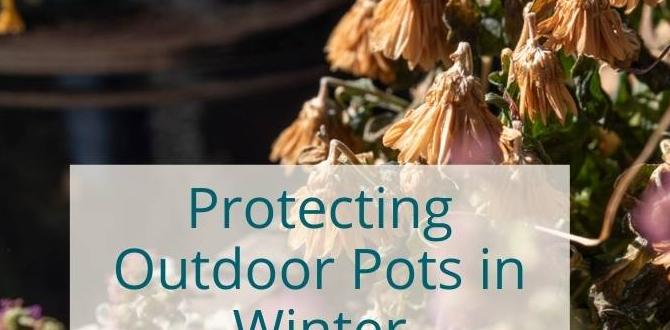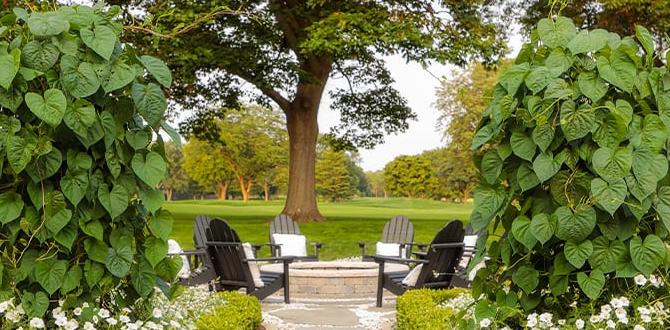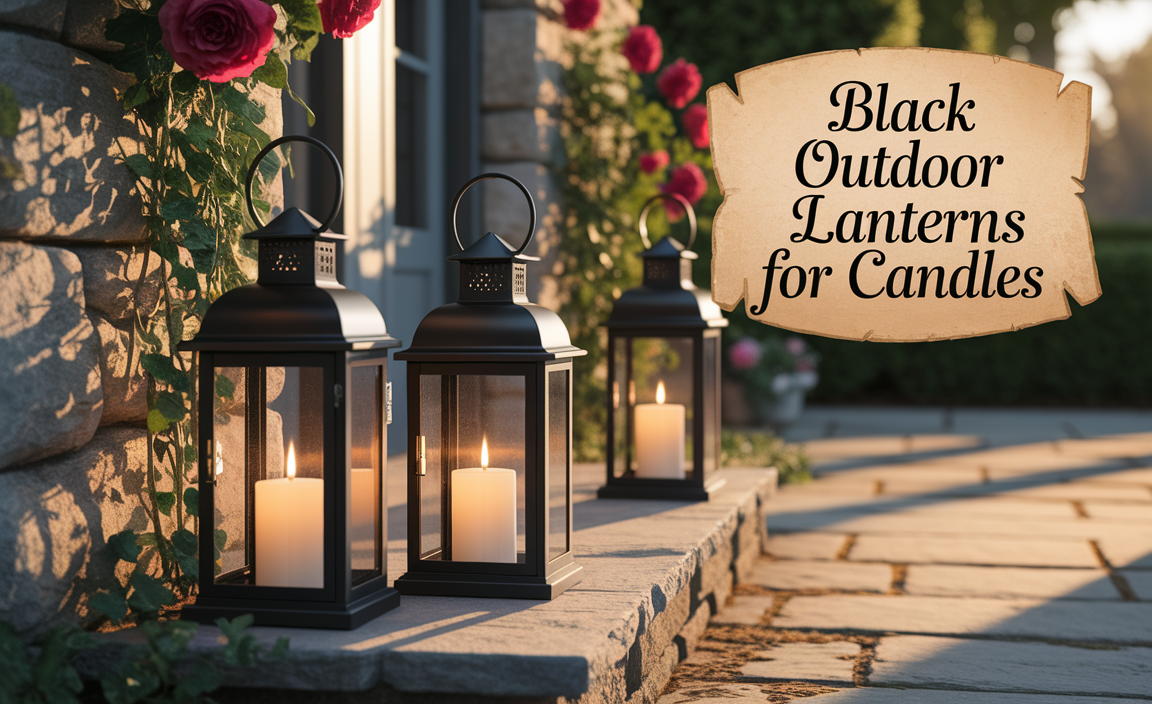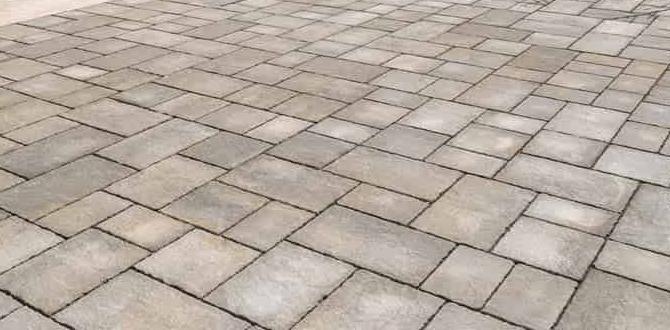Imagine stepping into a garden bursting with life and color. You can achieve that with something as simple as mulch! Mulch is more than just a pretty layer on top of the soil. It has magical powers that help plants grow strong and healthy.
Have you ever wondered how some gardens look so vibrant? The secret may lie in their use of mulch. Not only does it keep the weeds away, but it also helps the soil hold moisture. This means less work for you and happier plants!
Did you know that using mulch can save you time and money? It can boost your garden’s health without needing lots of chemicals or extra water. Plus, it comes in different types, from wood chips to straw. Each kind brings its own benefits.
In this article, we will explore the best types of mulch for gardening. We will also share tips on how to use it effectively. So, let’s dig in and discover how mulch can make your garden shine!
Essential Mulch For Gardening: Benefits And Tips For Success
Understanding Mulch for Gardening
Mulch is a gardener’s secret weapon! It helps keep soil moist, reduces weeds, and adds nutrients as it breaks down. You might wonder, why use mulch? Imagine a cozy blanket for your plants, protecting them from extreme temperatures. There are many types, like bark, straw, and even grass clippings. Each provides different benefits. Did you know mulching can also boost a garden’s beauty? With the right mulch, your plants thrive while you enjoy less work!What is Mulch?
Definition and types of mulch. Importance of mulch in gardening.Mulch is like a cozy blanket for your garden. It’s a layer of material spread on the soil. Different types include wood chips, straw, and bark. Mulch helps keep the soil warm, retains moisture, and keeps weeds at bay. Think of it as your plant’s bodyguard! A well-mulched garden can reduce water use by up to 50%, so you can save the water for long showers! Here’s a quick look:
| Type of Mulch | Benefits |
|---|---|
| Wood Chips | Prevents weeds and adds nutrients. |
| Straw | Great for moisture retention and keeping plants cozy. |
| Bark | Looks nice and helps with insulation. |
In short, mulch is an essential part of gardening. With its help, you can have a happier and healthier garden. So, mulch it up!
Benefits of Using Mulch in Your Garden
Moisture retention and soil temperature regulation. Weed suppression and soil aeration.
Using mulch in your garden has many great benefits. First, it helps keep moisture in the soil. This means plants get the water they need. It also keeps the soil temperature just right. Did you know that mulch can reduce summer heat by up to 10 degrees? Second, it fights weeds. Less competition means more space for your plants. Lastly, mulch helps the soil breathe by allowing air to move easily. Healthy soil is essential for strong plants!
What does mulch do for soil and plants?
Mulch keeps soil moist, controls temperature, blocks weeds, and improves air flow. These benefits help plants grow healthier and stronger, making them more vibrant in your garden.
How to Choose the Right Mulch for Your Garden
Considerations based on plant types and climate. Pros and cons of different mulch types.
Choosing the right mulch for your garden is like picking the perfect outfit—it needs to match your plants and weather! If you have delicate flowers, avoid heavy gravel. For warm climates, organic mulches like straw can keep the soil cool. Meanwhile, wood chips are great in rainy areas but might attract bugs. Here’s a quick look at different types:
| Mulch Type | Pros | Cons |
|---|---|---|
| Wood Chips | Good for moisture retention | Might attract pests |
| Grass Clippings | Free and nutritious | Can smell if too wet |
| Straw | Great for cooling | Can blow away easily |
Always consider your garden’s needs. You want your plants to thrive, not throw a tantrum! Choosing wisely can make your garden the envy of the neighborhood.
Application Techniques for Mulch
Stepbystep guide on how to apply mulch. Tips for maintaining mulch throughout the growing season.
Applying mulch can feel like a piece of cake, or should I say, a pie! First, clear away weeds. No one wants free-riders in their garden! Next, spread a layer of mulch about 2-4 inches thick. Think of it as giving your plants a cozy blanket. According to experts, maintaining mulch means topping it off as it breaks down. Keep your eyes peeled for any signs of wear and tear throughout the season!
| Steps | Tips |
|---|---|
| Clear weeds | Check for sneaky weeds! |
| Apply 2-4 inches | Consider it a cozy blanket! |
| Monitor regularly | Top up as needed! |
Common Myths about Mulch
Debunking misconceptions regarding mulching. Researchbased truths about mulch effectiveness.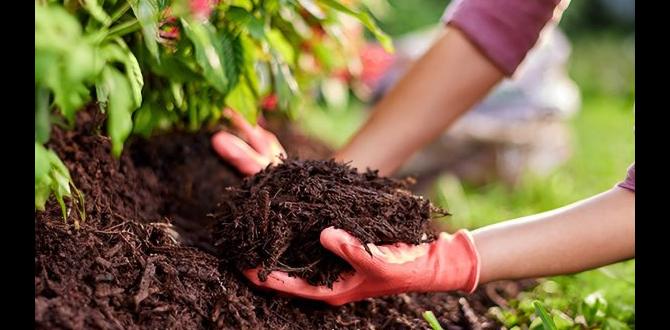
Many people believe that using mulch is unnecessary or even harmful. These myths can make gardening more challenging. For example, some think mulch seals the soil and blocks water. This is not true! Mulch helps keep water in the soil. Here are common misunderstandings:
- Mulch attracts pests: In fact, it can keep pests away by protecting plants.
- Mulch is only for decoration: It offers many benefits, like reducing weeds.
- All mulches are the same: Different types have different effects on plants.
Research shows that mulch is effective for protecting soil and plants. It also helps maintain heat and encourages healthy roots!
Does mulch really help plants grow?
Yes, mulch helps plants grow by maintaining moisture and temperature, reducing weeds, and adding nutrients to the soil.
Is it OK to use grass clippings as mulch?
Yes, grass clippings are great for mulch! They break down quickly and add nutrients back to the soil.
Using Mulch for Specific Gardening Needs
Mulch for vegetable gardens. Mulch for flower beds and ornamental gardens.
Mulch can be a superstar in your garden! For vegetable gardens, it helps keep the ground moist. This means fewer trips with a watering can. Plus, it fights pesky weeds that try to steal resources. In flower beds and ornamental gardens, mulch acts like a cozy blanket. It keeps roots warm and happy. It also looks fantastic, adding color and a clean look! Who wouldn’t want that?
| Mulch Type | Benefits |
|---|---|
| Organic Mulch (like straw) | Improves soil health, retains moisture |
| Inorganic Mulch (like rubber) | Lasts longer, reduces weeds |
Environmental Impact of Mulch
Sustainability of various mulch materials. Benefits of using mulch for soil health and biodiversity.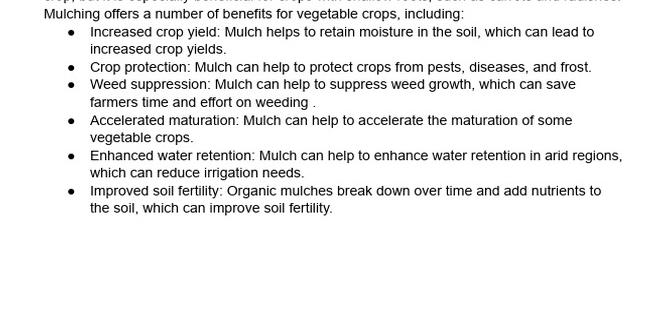
Mulch can be a superhero for our gardens! It comes from different materials like shredded leaves, wood chips, and even grass clippings. Each type has its own eco-friendly perks! Using mulch improves soil health by retaining moisture and preventing weeds. Plus, it creates a cozy home for tiny creatures like worms. These critters improve biodiversity. It’s like throwing a garden party for nature! So, why not invite them with some lovely mulch?
| Type of Mulch | Environmental Impact | Benefits |
|---|---|---|
| Wood Chips | Biodegradable | Improves soil structure |
| Straw | Renewable | Suppresses weeds |
| Grass Clippings | Recyclable | Nutrients for soil |
Frequently Asked Questions about Mulch
Common queries and expert answers. Troubleshooting mulchrelated issues in gardens.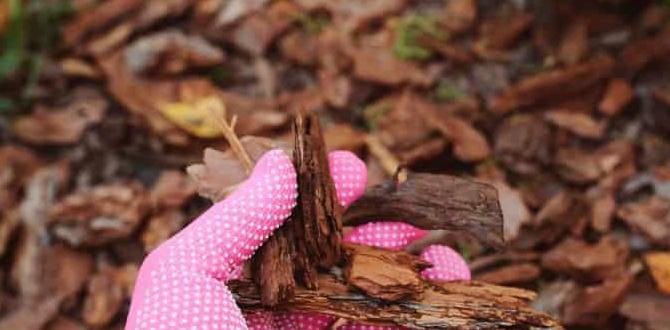
Many gardeners have questions about using mulch. Here are some common ones along with expert answers:
What are the benefits of using mulch?
Mulch helps keep the soil moist, blocks weeds, and adds nutrients. It also protects plants from temperature changes.
How thick should mulch be?
A layer of 2-4 inches is best for most plants. This thickness helps without smothering the plants.
Can too much mulch harm my garden?
Yes, too much mulch can cause root problems. It can also trap water, leading to rot.
Troubleshooting mulch issues
- Weeds: Check for gaps in your mulch. Add more if needed.
- Foul smell: This can mean your mulch is too thick. Rake it to let air in.
- Insects: Use organic pest control sprays if you see pests.
Using mulch correctly can make your garden thrive. Keep these tips in mind for the best results!
Conclusion
In conclusion, mulch for gardening helps keep soil moist, control weeds, and improve plant health. You can choose from different types, like wood chips or straw. Using mulch is easy and benefits your garden greatly. We encourage you to try it out and explore more about gardening techniques. Happy gardening!FAQs
What Are The Benefits Of Using Mulch In Gardening?Using mulch in your garden is great! It helps keep the soil moist, so your plants don’t dry out. Mulch also stops weeds from growing, which means less work for you. Plus, it adds nutrients to the soil as it breaks down. Finally, it makes your garden look neat and pretty!
What Types Of Mulch Are Best Suited For Different Plants And Garden Conditions?Different types of mulch help plants in various ways. For flowers, wood chips are nice because they look good and keep the soil cool. For vegetables, straw is great because it breaks down and adds nutrients. If you have acid-loving plants like blueberries, pine needles work well. In areas with lots of weeds, black plastic mulch can stop them from growing.
How Often Should Mulch Be Replenished Or Replaced In A Garden?You should replenish or replace mulch about once a year. Over time, it breaks down and loses its good qualities. Check it every few months. If it looks thin or worn out, add more. Fresh mulch helps your plants stay healthy!
Can Homemade Organic Materials Be Used As Mulch, And If So, What Are Some Examples?Yes, we can use homemade organic materials as mulch! Some good examples include grass clippings, leaves, and vegetable scraps. We can also use straw or wood chips. These materials help keep soil moist and block weeds from growing.
How Does Mulch Help With Weed Control, Moisture Retention, And Temperature Regulation In The Soil?Mulch helps keep weeds away by blocking sunlight, so they can’t grow. It also holds water in the soil, making plants stay moist. When it’s hot outside, mulch keeps the soil cooler. In the cold, it helps keep the soil warm. This way, your plants can grow better!

